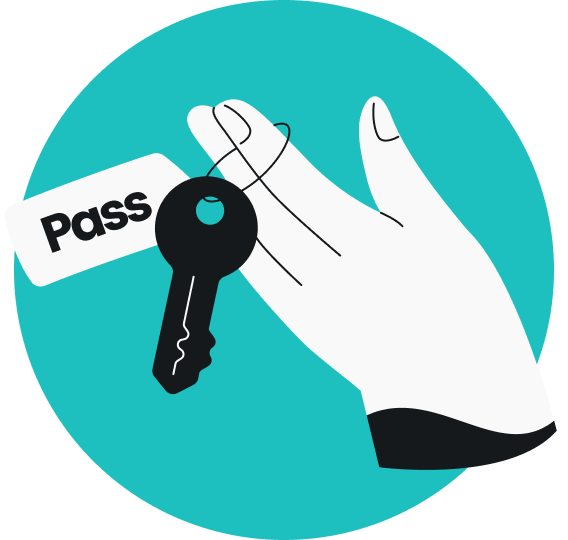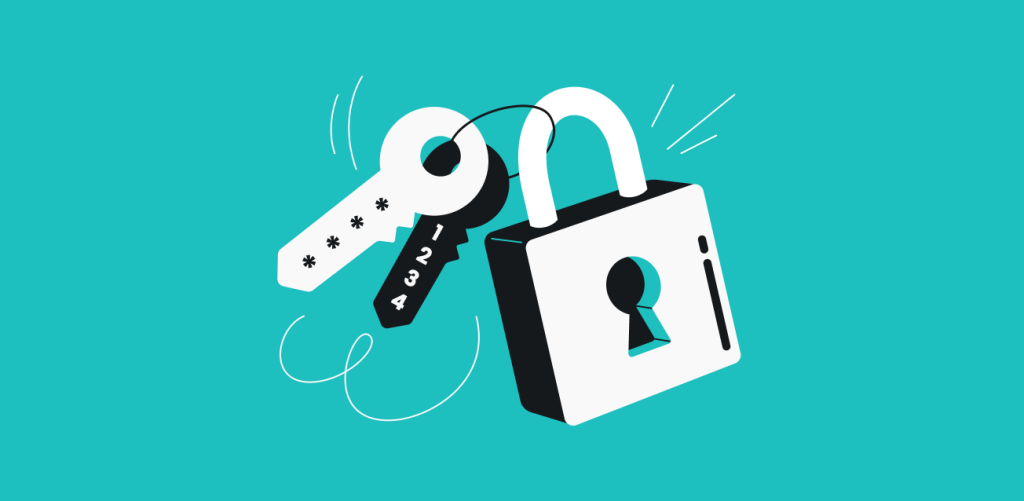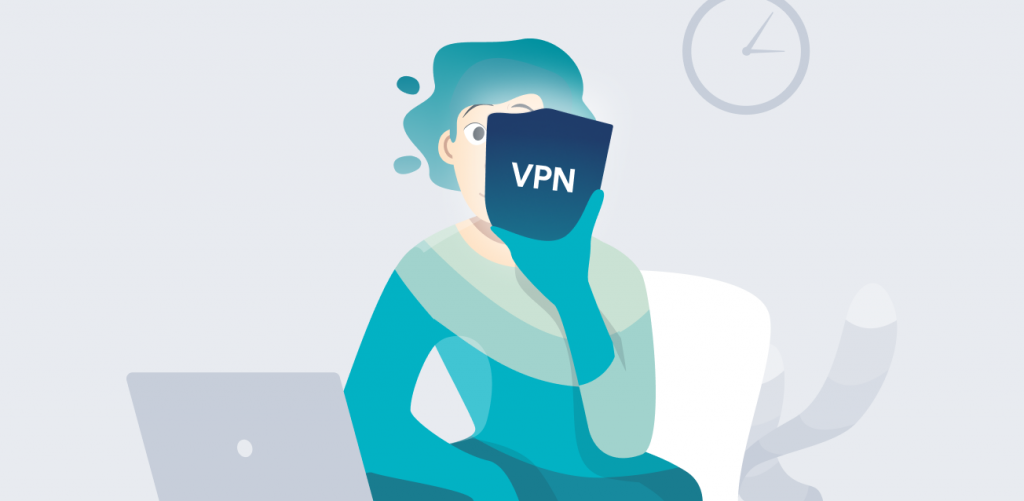A VPN (Virtual Private Network) is your gateway to online privacy, so having a strong VPN password is crucial to enjoying greater web security.
Cybercriminals can easily compromise a weak password, and stolen credentials may have serious consequences.
Let’s talk about how to create a strong VPN password and what might happen if you don’t have one.
Why do you need a strong VPN password?
The goal of a strong password is to prevent others from accessing your VPN account. Robust VPN passwords act as your first line of defense in protecting your online data.
Specifically, a strong VPN password:
- Prevents unauthorized access: weak passwords make it easier for criminals to hack your VPN account. If someone guesses your password, they can use your VPN and potentially intercept your internet activity;
- Protects sensitive data: VPNs are often used to secure confidential information, whether you’re browsing or working remotely. A strong password ensures info like banking details and private communications stay safe from prying eyes;
- Blocks credential stuffing: hackers often use stolen usernames and passwords from data breaches to try to access other services. A strong, unique VPN password helps keep your VPN secure when other accounts are compromised;
- Maintains privacy: VPNs are vital to protecting your online privacy. If a cybercriminal gains access to your VPN account, they can link your browsing activity to you and possibly expose your identity. A robust password makes this far less likely.
How VPN accounts are leaked and sold online
Password theft may be more common than you think — in a 2024 survey, 46% of Americans reported having their passwords stolen over the past year.
When it comes to your VPN account, having your credentials leaked and sold on underground forums or dark web marketplaces is a serious threat to your online security. Cybercriminals typically gain access to this information through the following methods.
Phishing scams
Hackers frequently use phishing emails or fake VPN login pages to trick users into entering their VPN passwords. These messages look authentic, often using official logos and language, but any information you enter is sent directly to the attackers.
Malware and keyloggers
Malicious software is frequently designed to monitor your activity and steal any user credentials it sees you entering. Similarly, a keylogger silently records everything you type into your device and transmits that information to your attacker.
The viruses responsible for this theft can be distributed through email attachments, malicious downloads, or infected websites, so it’s important to stay cautious as you browse the internet.
Data breaches
Even with a strong VPN password, your data can still be at risk if your VPN provider suffers a security breach. In these cases, hackers can potentially get long lists of user emails and passwords to leak or sell online.
What to do if your VPN account is stolen
If you suspect someone stole your VPN password and is using your account, contact the VPN provider’s customer support team. They should be able to walk you through a password reset before any serious harm is done.
That said, changing your VPN password only helps you out if your account has a unique password that isn’t used anywhere else. If you use a few combinations of the same password everywhere, you might have to change your other passwords too.
After stealing one of your passwords, hackers frequently try to use it on your other accounts, such as your email or social media.
The result? You can fall victim to different kinds of identity theft, which might even lead to significant financial losses.
Practice good password hygiene — on all your accounts — to make sure a stolen VPN password doesn’t turn into something much worse.
How to create a strong VPN password
You know you need a unique and secure password for your VPN account, so let’s go through the steps to create one.
- Keep it random: a strong password shouldn’t include common words like phone, computer, or even password, as these are too easy to crack. Better yet, don’t use any words at all — a random code of letters, numbers, and symbols is typically the way to go;
- Avoid personal characteristics: weak passwords often include names, birth dates, or personal interests. Using any of these means complete strangers might be able to correctly guess your credentials. Leave the personal details out;
- Make it long: password length plays a major role in protecting your account. Strong passwords are generally long passwords, as having few characters makes a cybercriminal’s job too easy. Aim for a password length of at least 10 characters;
- Don’t recycle your password: make each of your passwords unique. Every time you reuse a password, you risk weakening your overall online security, so keep your VPN password different from any others you have;
- Don’t write down your password: your password shouldn’t be noted anywhere, whether it’s in your phone, on a piece of paper, or somewhere else. This only increases the odds of someone else finding and using your VPN credentials;
- Use a password generator: if you can’t think of unique, secure VPN passwords on your own, use a password generator. There are plenty of free tools online that generate strong passwords to use on your various accounts;
- Use a password manager: if you’re worried about forgetting your password, you can use a reliable password manager to safely access your various passwords at any time.
Pro tip: All of the following are examples of secure passwords you can use as inspiration for your own:
- &ows6LoL9G*%6Hd28Ek3
- Ji6bm*ZI86q4M7Y
- utQ$PSMg9H1eZW4*6O
Troubleshoot VPN login issues
At times, you may fail to log in to your VPN account, even if no one fiddled with your password. If you’re using Surfshark VPN, you can try the following troubleshooting steps to fix your login issues.
1. Turn off other VPNs
You may not be able to log in to Surfshark if you’re connected to any other VPN accounts. Disconnect from every VPN, and then try to log in to Surfshark again. In some cases, you may even need to reinstall the Surfshark app and restart your device.
The same might happen if you try to log in to your profile on the Surfshark website while connected to one of our VPN servers. Simply disconnect or connect to a different server and try again.
2. Don’t hide your email
When iOS or macOS users log in to Surfshark for the first time, the app may request to see their email address to identify the account.
To make this visible, go to Settings > Apple ID > Password & Security > Apps using Apple ID. Select Surfshark > Stop using Apple ID.
After that, simply go back to the Surfshark app and choose the Show my mail option when logging in.
3. Update your app
The source of login troubles may be as simple as your app being out of date. Update it via your app store or download the latest version here. Reinstall it, and you should be good to go.
How to set up a new VPN password
If you suspect that your VPN password has been stolen or leaked, you need to change it. The process for doing so varies depending on whether you currently have access to your VPN account.
Change your VPN password
If you can use your VPN account but fear that your password has been leaked, change it through the VPN settings:
- Open the Surfshark app.
- Go to Settings > My account > Change password.
- Enter your current password and your new password.
- Select Save to change your password.
Reset your VPN password
If your password has been stolen or you simply can’t remember it, you’ll need to reset it. Here’s how:
- Visit https://my.surfshark.com/auth/reset.
- Enter the email address you used to register your account.
- Select Get the reset link.
- Open the password reset email that’s sent to your inbox and select Reset your password.
- Enter a new password and select Confirm new password to complete your reset.
Keep your passwords private and secure
Generating strong, unique passwords for every online profile is your first step to increased safety on the web. While no tool can fully protect you from stolen passwords, you can reduce the risk with Surfshark’s all-in-one cybersecurity suite.
Going beyond basic VPN protection, Surfshark also offers antivirus software, data leak monitoring, an alternative online persona generator, and more.
Take your online safety to new heights with Surfshark.
FAQ
Can a VPN help protect my passwords?
Yes, a VPN can help protect your passwords while you’re typing them in and sending them over the internet. A VPN encrypts all the data leaving your device — including your passwords as you enter them on websites or apps — so if someone tries to intercept your connection, they won’t be able to see your information.
Just remember, a VPN protects your passwords in transit, not those already stored on your device. A VPN also doesn’t strengthen weak passwords or help against phishing attacks or malware that try to steal them.
Is my password visible to my VPN provider?
No, a reputable VPN shouldn’t be able to see your passwords. Surfshark doesn’t keep any logs of your activity, so any text you enter online stays private — including your passwords.
However, not all VPN providers are trustworthy, and free VPNs may collect your data or even sell it to third parties.
How do I find my VPN password?
For the sake of your online security and privacy, you should keep all your passwords in a password manager. If you don’t do that and can’t remember your VPN password, your best bet is to reset it to a new one.
You can reset your Surfshark password at https://my.surfshark.com/auth/reset.
How often should I change my VPN password?
It’s a good idea to change your VPN password once a year under normal circumstances. You should also change your password immediately if you feel like it may have been stolen or compromised in a data breach.





